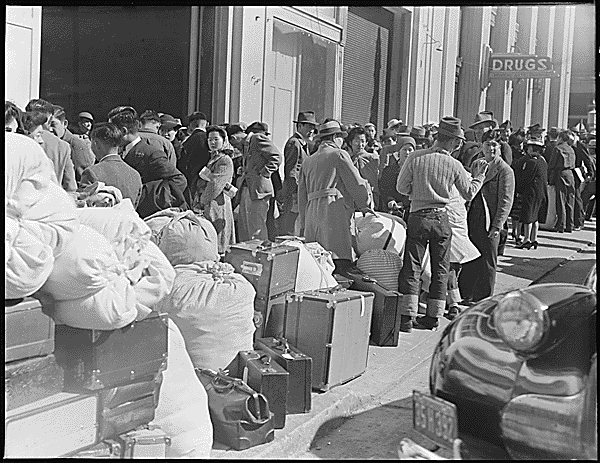Author’s note: I originally wrote this story 2013 for a children’s book about the Japanese American World War II experience. I published it on 8Asians in 2014. However, with the recent events and rhetoric surrounding our presidential election, I started becoming worried that the events of this short story could happen again—not to Japanese American but to Muslim and Arab Americans.
I wanted to reimagine these events if they happened today to help make sure it doesn’t happen again. As I tell my four-year-old every day, we as decedents of people who were wrongly incarcerated in camps have a moral responsibility to make sure it never happens again. Here is my way of reminding us of our past so we don’t repeat it again.

Goofy (Pt. 3)
After the executive order, Moe’s life changed right away. He stopped going to school and his family wasn’t allowed to leave the house at night. Moe spent the first couple of days playing with Goofy and with Julia once she got back from school.
Moe noticed a lot of strangers were going in and out of his front door and how things around the house were slowly disappearing. He found his mom arguing with a man over a brand new vacuum cleaner his dad had bought her for their anniversary.
“This is brand new and worth five times what you’re offering,” Mrs. Hassan told the man.
“Take it or leave it, Ma’am.”
Mrs. Hassan shook her head and when the man left, Moe asked her, “Why are you selling the vacuum cleaner?”
“We have to sell everything,” Mrs. Hassan answered, “They are only letting us take one suitcase each.”
Goofy barked, which gave Moe an idea. Since they could each take one suitcase, they could put the vacuum cleaner in Goofy’s suitcase. After all, Goofy was a dog and didn’t have anything to bring. He told his mom his idea.
Moe knew something was wrong because his mom wouldn’t look at him. When she finally did, she said, “Goofy can’t come with us. You’ll have to find a new home for him.”
Moe ran up to him room and cried. He hugged Goofy all night. It was the saddest he had ever been.
The next morning, Moe knew what he had to do. He had two days to find a new home for his best friend. The first person he went to was Julia. He asked her if she could take Goofy, but she shook her head no.
“My mother’s allergic to dogs.”
Moe was not going to give up so easily. He went from house to house on his street looking for another family that would adopt Goofy. Some of the people slammed the door in his face, a couple adults even called him mean names.
No matter how hard Moe looked, he couldn’t find anyone willing to take his dog. Goofy knew something was wrong, but tried to make Moe feel better by licking his face and chasing his tail.
The morning Moe and his mom had to leave, Moe had still not found a home for Goofy. He told Goofy in his bravest voice, “I’m sorry, you’ll have to find a place on your own.”
Goofy barked, which was his way of saying, “Don’t worry about me.”
Moe whispered in Goofy’s ear, “I love you.”
Moe waved goodbye as Goofy ran down the street. Moe began to cry, but when he saw his mom’s tears, he remembered his father’s words and tried to be strong for her. Together, they carried their suitcases down to the bus that was going to take them away.
When Moe and his mom got to the bus stop, there were other families already there with their suitcases. Everyone looked really sad. Moe felt the same way, but tried to act brave.
The bus soon came and as Moe was about to get on with his mom, he saw Julia and her mother running down the street. Next to them was Goofy.
With tears in her eyes, Julia told Moe goodbye and explained that Goofy had come to their door. He was so sad looking that Julia’s mother said it was okay for her to keep him until Moe got back.
Moe and his mom got on the bus with all the others in their neighborhood and they rode to the train station in silence. On the train, Moe missed his dad and Goofy, but it made him feel a little better knowing that at least Goofy had a good home.
When they finally arrived at the “Relocation Center,” which was really a prison in the high deserts of California, Moe found a reason to smile. Mr. Hassan was waiting for them. Moe didn’t realize he had missed his father so much.
Approximately 110,000 Japanese Americans were forcibly removed from their homes during World War II and sent to one of ten remote “camps” around the country. Their only crime: looking like the enemy.
Follow me at @ksakai1.








